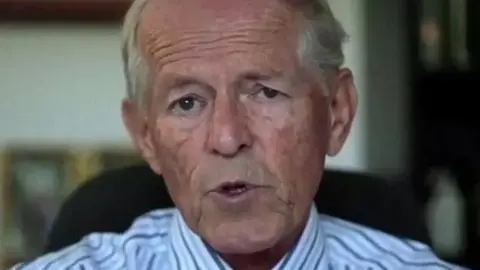Ten Church of England clergy face disciplinary action
 BBC
BBCThe Church of England says it is initiating disciplinary proceedings against 10 members of clergy following a review of evidence in the report into the prolific abuser, John Smyth.
Among those facing action are former Archbishop of Canterbury George Carey and Rev Andrew Cornes - who was due to be on the committee picking the next Archbishop of Canterbury.
Smyth, who died in 2018, used horrific violence to attack boys at his Winchester home in the 1970s and 1980s, the Makin Review into his abuse found.
Justin Welby, who stepped down as Archbishop of Canterbury earlier this year because of the scandal, is among several senior figures not facing action because of "insufficient evidence" for disciplinary proceedings.
Also not facing action but coming under criticism in the Makin Review are four serving bishops - the current Bishop of Lincoln Stephen Conway, Bishop of Episcopal Ministry in the Anglican Communion Jo Bailey Wells, Bishop of St Edmundsbury and Ipswich Martin Seeley and the Archbishop of Cape Town Thabo Makgoba.
A survivor of Smyth's abuse told the BBC he was relieved that some were "at long last" being held to account for their failings but said he was surprised others had not been named.
The long-awaited report was released in November and detailed "the prolific, brutal and horrific" abuse perpetrated against more than 120 boys and young men by Smyth at Christian camps from the late 1970s in England until his death in South Africa in 2018.
That review led to the resignation of Justin Welby for what he acknowledged was his "personal and institutional responsibility".
The Church's National Safeguarding Team has since reviewed the evidence against nearly 40 other active clergy criticised in the report, deciding that some of it meets the threshold for further action.
Those who are facing disciplinary proceedings by the Church of England are accused in the report of various degrees of failing to act during the timeline of Smyth's abuse.
The report said former Archbishop of Canterbury George Carey had been informed of the abuse in an outline of a report in 1983 which "contained enough information about abuses to signal a need for action regarding John Smyth".
Lord Carey denied seeing it and told the review he did not know Smyth when he studied at Trinity Theological College when Lord Carey was principal. Makin said that "seems highly unlikely" given Smyth's public prominence at the time.
He gave up his "permission to officiate" in December following a BBC investigation into the Church of England's handling of a separate sexual abuse case.
Another priest that now faces disciplinary action is Canon Andrew Cornes, a retired clergyman from the Chichester diocese who was due to be a member of the Crown Nominations Commission that will appoint the next Archbishop of Canterbury.
The Makin review said Rev Cornes was told in 1982 by a victim of Smyth about abuse he suffered. It said there was "no evidence to suggest that Andrew Cornes took action to respond to this, he suggests that he thought that the matter was being dealt with".
The Church of England has clarified that Rev Cornes has "voluntary stepped back from ministry pending the outcome of this process and will not be participating in the Crown Nominations Commission".
The full list of clergy to face disciplinary action includes:
- Bishop Paul Butler
- Bishop George Carey
- Rev Roger Combes
- Rev Sue Colman
- Rev Andrew Cornes
- Rev Tim Hastie-Smith
- Rev Hugh Palmer
- Rev Paul Perkin
- Rev Nick Stott
- Rev John Woolmer
Because of the length of time after their alleged failures to act took place, the initiation of the disciplinary process for each needs to be approved by the Church's President of Tribunals.
Given the vulnerability of the victims involved, it is understood they are likely to proceed.
The so-called clergy disciplinary measure process could lead to anyone found guilty being prohibited from exercising church ministry for life.
Mark Stibbe was groomed and brutally beaten by Smyth after joining his school's Christian Forum in 1977 and has waited decades for justice.
Mr Stibbe said he was "relieved" those identified in the review would be "held to account for their failings".
"I, along with my fellow Smyth survivors, wait with keen interest to see whether any disciplinary measures are enforced," he said.
"I am surprised that those senior clergy who in 2013 knew the full extent of Smyth's abuses, and who did not properly ensure that Smyth was brought to justice, are not named in the list released today," he added.
"Nevertheless, it's good to know that after all these years not only the truth is being discovered but that justice is being done".
Alexander Kubeyinje, the Church of England's national director of safeguarding, said survivors and victims had endured lifelong effects from Smyth's "appalling abuse".
"We have announced next steps in the process looking at both risk and disciplinary processes," he added.
Smyth had also worked as a barrister representing morality campaigner Mary Whitehouse whilst he ran the camps for young evangelical Christians.
Reports of his physical abuse of boys were first revealed in an investigation by Channel 4 News, in February 2017.
Smyth and his wife Anne were excommunicated by his local church in Cape Town, South Africa, the year before he died.
Additional reporting by Tom McArthur
BBC Action Line: If you have been affected by issues in this story, find out what support is available here.
